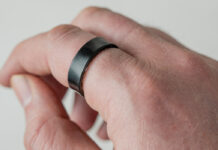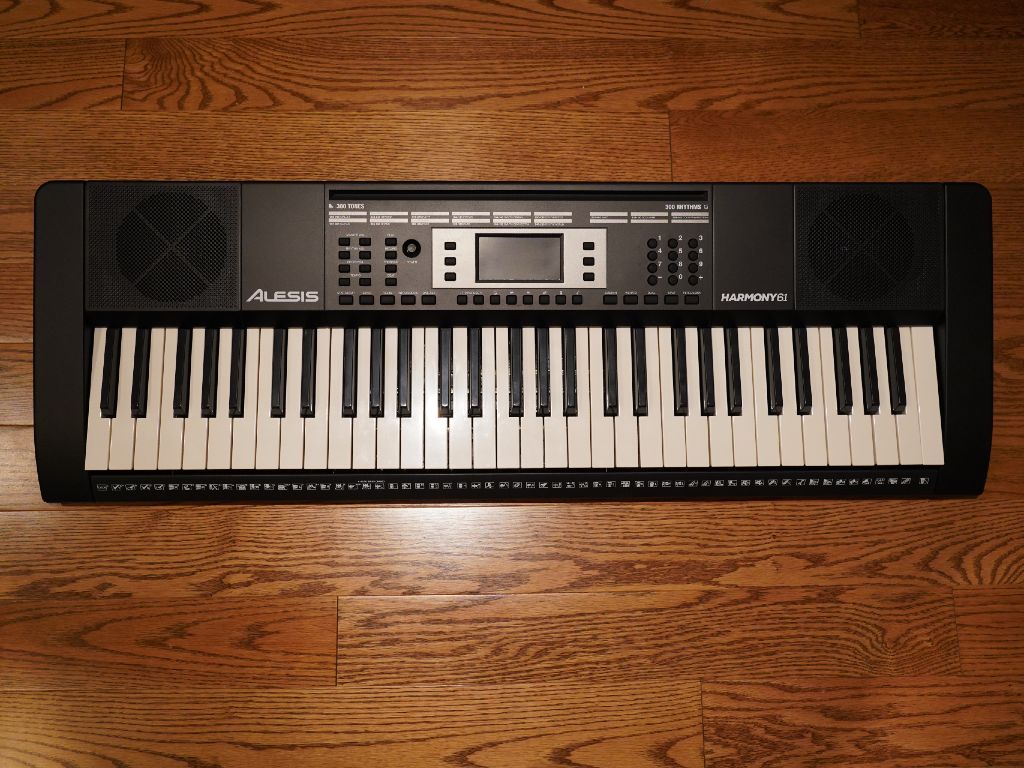 Although Alesis is more recognized for its drum machines and rack gear, the manufacturer has had some success with various synthesizers over the years. Recently, they have been exploring the entry-level market with the addition of a few products at that level. One of these is the Harmony 61, a portable, 61 note keyboard. Let’s see if some of that experience translates to the budget-friendly category.
Although Alesis is more recognized for its drum machines and rack gear, the manufacturer has had some success with various synthesizers over the years. Recently, they have been exploring the entry-level market with the addition of a few products at that level. One of these is the Harmony 61, a portable, 61 note keyboard. Let’s see if some of that experience translates to the budget-friendly category.
First of all, make sure to check out this video I recorded featuring some sound samples as well as my initial impressions.
Unboxing the Alesis Harmony 61 bundle
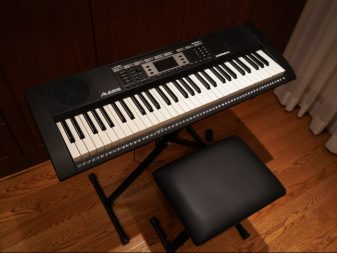
The Harmony 61 is shipped as a bundle. It comes with a lot of accessories that will get you up and running without any other additional purchases. First of all, you get an all-important stand. It’s a simple X design, but it’s sturdy enough to keep your instrument safe. It’s also adjustable, so you can set it to the appropriate height. You also receive a basic bench. It has a simple mechanism and seems solid enough to support you for hours on end while you practise. A pair of headphones is included, for silent sessions without annoying anyone in the household. Lastly, you get a microphone to amplify your voice. This is a fun addition—especially for kids. You won’t be able to do much with it, apart from amplifying your voice, but it’s still a great way of getting into music nonetheless.
For its internal features, the Harmony has a nice, large collection of tones: three hundred to be exact. These range from regular pianos and organs to guitars, synths, and sound effects. Your tonal palette is expanded thanks to dual and split modes. These will layer two voices together or split the range of your instrument in two different sounds, respectively. You will also get access to 300 different built-in accompaniments to work on your timing, chords, and even compositions. These range from pop grooves to rock and even waltz. The recording feature will allow you to listen back and analyze your playing or critique your songwriting.
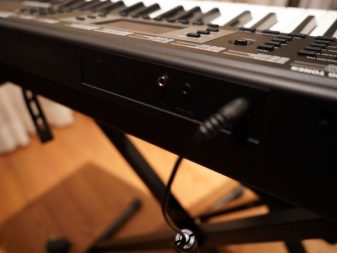 Although the bundle has many accessories, a sustain pedal is missing. Not only is it missing—the actual keyboard doesn’t have an input for a third-party model. You’ll have to resort to using the sustain button that’s on the keyboard itself. This is a big oversight in my opinion and will definitely be felt by most players. The only connections you will find are the headphone output and the microphone input.
Although the bundle has many accessories, a sustain pedal is missing. Not only is it missing—the actual keyboard doesn’t have an input for a third-party model. You’ll have to resort to using the sustain button that’s on the keyboard itself. This is a big oversight in my opinion and will definitely be felt by most players. The only connections you will find are the headphone output and the microphone input.
Harmony 61 lightweight design
The Harmony 61 itself is very light. This makes it an ideal instrument to carry around to different practice spaces. Take it with you to rehearsals, lessons, or the cottage; it won’t be an issue at all. It also makes it very convenient to store at home without much hassle. For transport, I highly recommend looking into a universal 61 note case for added protection. Alesis doesn’t seem to make a dedicated one for this model.
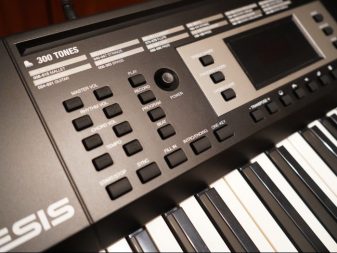 The airy construction might sound like a great feature, but this particular instrument might be a little too light. It definitely feels flimsy and fragile. I’m afraid a few too many bumps would dent the shell, or worse—affect the electronics.
The airy construction might sound like a great feature, but this particular instrument might be a little too light. It definitely feels flimsy and fragile. I’m afraid a few too many bumps would dent the shell, or worse—affect the electronics.
This also plays into the actual feel of the keys. They are very delicate and don’t have the best sensation to them. If you’ve played a few different keyboards, this might affect your enjoyment. The edges of the model are also slightly bendy, which doesn’t inspire any sort of confidence in the longevity of this product.
Humble sound quality of Harmony 61
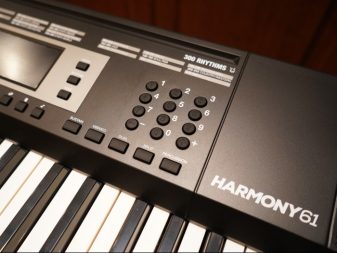 Sound-wise, the Harmony 61 is a very humble sounding unit. The sounds are definitely recognizable, but I wouldn’t say that this is the best sounding unit I’ve ever heard. There isn’t much detail or richness to the instruments. This is especially noticeable if you’ve spent a lot of time with high quality sound banks in the past. The same goes for the accompaniments. They are short and slightly stale, so don’t expect a banging backing track to work your chops with. To hear all this in action, you can watch my video review that features the basic piano tone and an example of a built-in rhythm track.
Sound-wise, the Harmony 61 is a very humble sounding unit. The sounds are definitely recognizable, but I wouldn’t say that this is the best sounding unit I’ve ever heard. There isn’t much detail or richness to the instruments. This is especially noticeable if you’ve spent a lot of time with high quality sound banks in the past. The same goes for the accompaniments. They are short and slightly stale, so don’t expect a banging backing track to work your chops with. To hear all this in action, you can watch my video review that features the basic piano tone and an example of a built-in rhythm track.
There isn’t any dynamism either, so you’ll be stuck with the same sample no matter how hard or soft you play. Speaking of dynamics, the volume coming from the speakers isn’t very flexible; it seems to me like the minimum volume should be quieter, and it was difficult to set it to the desired level.
Another issue is that the keyboard seems to be noisy. You don’t get a clear signal, and there is some static-type hissing in the background. It’s even more apparent when you put on the headphones. These artefacts are slightly distracting and can affect the overall playing experience. This is actually a rare phenomenon with music gear and usually doesn’t happen in the products I review.
An affordable starting point
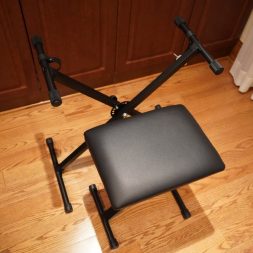 If you are looking for a beginner’s keyboard, the Harmony 61 might be of interest to you. It has a really attractive price and is fully loaded with all the accessories you will need. This adds considerable value to an already affordable bundle. It’s a great way to figure out if you or your children have a solid interest towards this instrument. When I was working at a music store, this was the main concern; parents just don’t know if their kids will stick with it for any period of time. Additionally, you’ll also get a 3-month premium subscription to Skoove. This is a dedicated piano learning platform which is a great place to start or to supplement private lessons with.
If you are looking for a beginner’s keyboard, the Harmony 61 might be of interest to you. It has a really attractive price and is fully loaded with all the accessories you will need. This adds considerable value to an already affordable bundle. It’s a great way to figure out if you or your children have a solid interest towards this instrument. When I was working at a music store, this was the main concern; parents just don’t know if their kids will stick with it for any period of time. Additionally, you’ll also get a 3-month premium subscription to Skoove. This is a dedicated piano learning platform which is a great place to start or to supplement private lessons with.
All this being said, make sure you understand that this isn’t the highest quality beginner keyboard available. Its light construction might affect its durability—especially if you carry it around, and the sounds aren’t the most inspiring. The absence of a sustain pedal is also a big thing to remember. While other models exist on the market that present a better construction and sounds, the Harmony 61 is still hard to beat price-wise.
Make sure you check out the Alesis Harmony 61 on Best Buy’s website.

